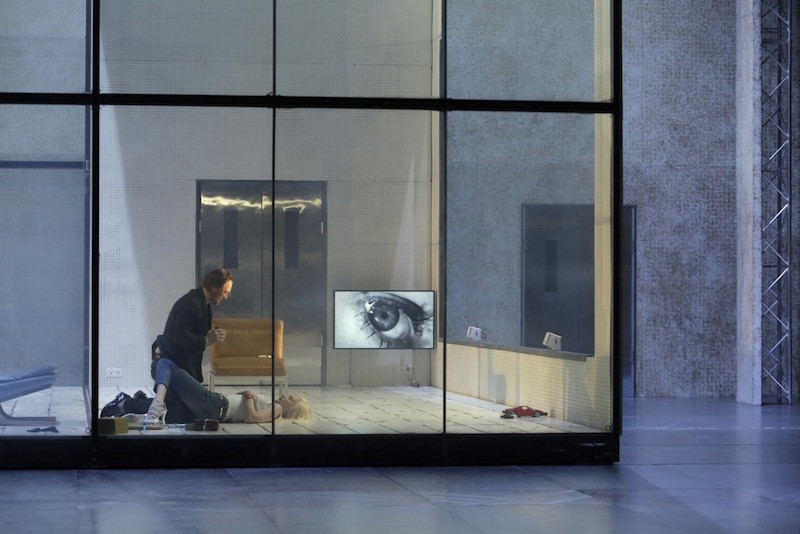British audiences are no longer scared of European theatre. It has taken us years – decades – to feel relaxed about non-representational stagings, actors stripped of plummy tones, the fourth wall not only breached but blown to smithereens. Ivo van Hove and Thomas Ostermeier are our adorable foreign uncles who visit every couple of years with cool gifts. Katie Mitchell, Simon Stephens and Lyndsey Turner are boho relatives with charming foreign ways. And we’re pretty much down with that.
And the comes Phaedra(s), visiting LIFT (the London International Festival of Theatre) from l’Odéon in Paris, and it is so massively European, so uncompromisingly, horse-frighteningly French, that the waters of the English Channel might rise in alarm to repel the invaders.
Most versions of the Phaedra myth – in which Theseus’ wife falls catastrophically in lust with his son Hippolytus – are beyond British comfort zones. Classical texts by Euripides or Seneca are testing; more so the lapidary torment of Racine, challenging instinctively sardonic actors like Glenda Jackson or Helen Mirren to discard irony as they enter the verse tragedy.
Isabelle Huppert stars in Phaedra(s) which, as the title suggests, takes several versions of the story – by Wajdi Mouawad, Sarah Kane (out of Seneca), JM Coetzee and, finally, Racine. The production by Polish director Krzysztof Warlikowski is mighty meta – it opens with Huppert’s raucous Aphrodite discoursing on the origins of democracy in a Cicciolina wig, and closes with her arch academic whimsically describing the erotic power imbalance between gods and mortals. It all makes for an unassimilable 220 minutes, from the stunt philosophy texts and hooker deluxe costumes (Warlikowski doesn’t believe in woman who don’t wear heels) to the disconcerting take on gender: an exotic dancer in big shoes and small pants performs endless routines – figuring Phaedra as the immigrant woman of uncomfortable sexuality, perhaps, but in a crude fashion.
‘Hate me now?’
But what seals the Anglo-Euro divide in this production is Hippolytus’ sock. In Sarah Kane’s 1996 play Phaedra’s Love, the centrepiece of this production, the prince (Andrzej Chyra) does not cling to his chastity, but rather to his shame. He’s a mucky pup, stuffing his face with burgers, his eyes with movie violence, his dick into the nearest hole or hand. Or, frequently, sock. Now, a British audience will always snigger at an adolescent wanking into a sock: you could probably show a montage of Men Behaving Badly, The Inbetweeners and Fresh Meat at an immigration hearing and offer citizenship to anyone making the appropriate ‘fnarr’ noises.
I won’t claim Phaedra’s Love for farce, though Kane did describe it as ‘my comedy.’ Hippolytus is the ultimate disillusioned youth skulking in his bedroom, and his refusal to reciprocate the narratives of desire, faith or power that he is offered is blackly funny. This snotty, selfish boy brings down a dynasty without even trying – ‘Hate me now?’, he asks repeatedly. And, yes, the fetid wankpit is a grossly comic setting.
Hosiery is a minor player in classic British drama. Hamlet’s downcast stockings are the first signs of his supposedly wavering wits; Malvolio’s yellow stockings an index of unhinged aspiration. The male lower leg is, on stage, an undignified appendage, and if you notice what it’s wearing, then it’s probably letting someone down.
Not so here. There’s wit in Huppert’s dry readings of Kane’s increasingly baroque stage directions (‘a vulture descends and starts to eat his body’), but Warlikowski smooths over the twitchy self-disgust and depression. Kane’s gross prince is tucked into a nice little suit, and the play is staged in a chic cube (photo above by Pascal Victor), the shower scene from Psycho playing on a loop, and a water-torture reverberation filling the air with portent.
The socks into which this Hippolytus snots and spunks aren’t the terrible novelty items or greyed-out M&S standards of the British bedroom; from a distance, they looked soft, slender numbers, sashaying onto the stage straight from the Place Vendôme. It’s perhaps surprising that a smutty gag could conduct us to the heart of a play about depression, male rage and pointlessness. But there you are: a sticky sock is key. Huppert is a blazing presence, but you can’t help anticipating the next in that series of smug books: French women don’t get smut.
Follow David on Twitter: @mrdavidjays


Leave a Reply